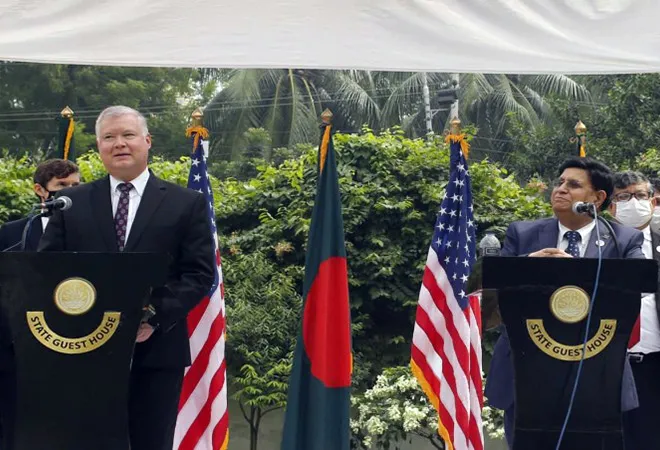
US Deputy Secretary of State Stephan Biegun, during his visit to Bangladesh in October this year, observed that his country is looking towards Bangladesh as a key partner in its Indo-Pacific Strategy (IPS). During his visit, Biegun met top Bangladeshi leaders, including Prime Minister Sheikh Hasina and Foreign Minister Abdul Momen and officials.
During the visit, the two countries discussed issues including long term economic and development partnership, cooperation on tackling the Covid-19 pandemic, Rohingya refugee crisis. However, Beigun’s primary emphasis in all the forums was on the IPS, indicating the US’s desire for Bangladesh to support the IPS.
Bangladesh, a member of China’s Belt Road Initiative (BRI), however, has been cautious in its response since it fears any hasty reaction might be detrimental to the country’s interest. Dhaka’s apprehension arises from the popular perception of the IPS being a counter to the Chinese BRI.
Bangladesh is reluctant in joining an international initiative that has security and strategic ramifications. The country is apprehensive that joining the Indo-pacific initiative might drag it into a conflict. Despite this scepticism, the US’s focus on Bangladesh opens a realm of opportunity for the country. Bangladesh needs to introspect how the US attention could be utilised to its s best interest.
Economic ties
The IPS over the regions of the Indian Ocean and the Pacific Ocean and is US’s major initiative in Asia. Under the IPS, the US propagate the vision of free, open, inclusive, peaceful and secure Indo-Pacific region, with shared prosperity for all. To attain this goal, US wants to expand economic ties with the countries in the region by involving greater private sector participation. Enhancing security cooperation is also an important aspect of the IPS.
Bangladesh’s geographical location has been a key reason for the US’s interest in the country. The county is a littoral of the Bay of Bengal, the region integral to the Indian Ocean and a major maritime trading route. Further, Bangladesh’s impressive economic and social development added to the US interest.
‘Basket case’ no more
The country once referred to as a ‘basket case’ is one of the fastest-growing economies in Asia. In 2020, Bangladesh’s per capita income has surpassed India, it's neighbour and regional power. The country is a global leader in readymade garment export. It has a strength of human capital due to the presence of a large young population with an impressive human developmental record.
Bangladesh is now considered to be a country of potential. Since the IPS focus on strengthening the business relationship with countries of the region, Bangladesh’s credentials help to make the IPS lucrative for the businesses to participate in. Bangladesh could be an ideal destination for the businesses to invest in that could bring significant dividends to the businesses.
The two basic objectives of Bangladesh’s foreign policy have been enhancing economic development and trade. Given these objectives, Bangladesh could significantly gain from the IPS. In this regard, infrastructure is an area where Bangladesh could gain substantially from the IPS. Notably, the development of the infrastructure has been one the focal area of the IPS.
Interestingly, Bangladesh is emphasising on developing its infrastructure also. The country is seeking financial assistance from various international agencies to support various infrastructure developmental activities. One of the primary reasons for Bangladesh to join the BRI was the financing of its infrastructure project. China has promised to provide $24 billion for the development of infrastructure in the country. IPS could help Bangladesh to secure funding for various developmental work.
Security alliance?
Despite the IPS’ thrust on development, it is perceived more as security alliance and has been a cause for Bangladesh’s reticence. The popular opinion in the country has been that the IPS is contradictory to the country’s foreign policy principle -- ‘friendship to all and malice to none’. Bangladesh fears joining the IPS might upset its relationship with China, its strategic ally.
Similarly, the country cannot overlook its relationship with the US. The US has been a major development partner. Besides, it has close economic and security relations. The US is the single largest export destination of Bangladesh RGM, country’s biggest export product. Besides, the US is the second biggest investor in Bangladesh.
The IPS has put Bangladesh in a critical situation. The challenge before the country is how to balance its relationship with China and the US without upsetting its interest. Until date, the country has fared well in maintaining a good relationship with all the great global powers. It will be worthy to watch Bangladesh’s future moves in tackling the strategic challenges that might arise as the global powers increasingly become assertive in explicating their influence in the region.
This essay originally appeared in South Asia Weekly
The views expressed above belong to the author(s). ORF research and analyses now available on Telegram! Click here to access our curated content — blogs, longforms and interviews.




 PREV
PREV


